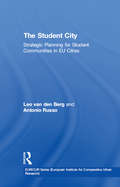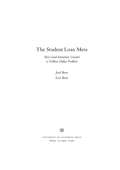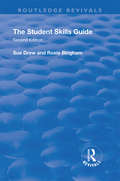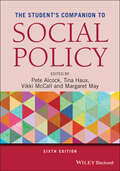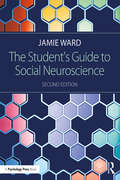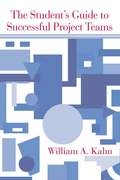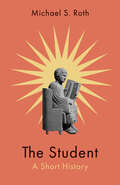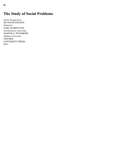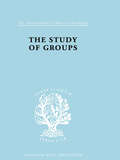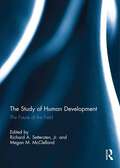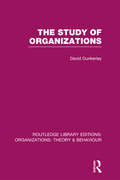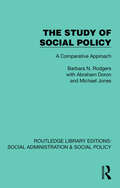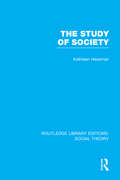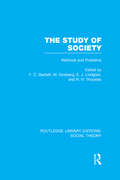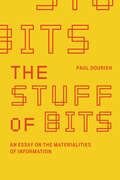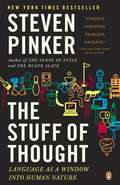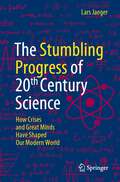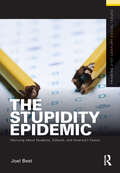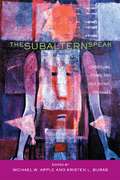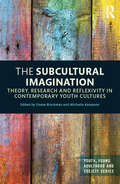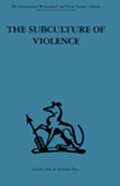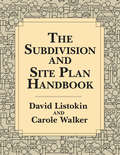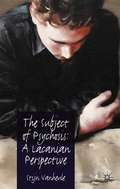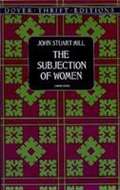- Table View
- List View
The Student City: Strategic Planning for Student Communities in EU Cities (EURICUR Series (European Institute for Comparative Urban Research))
by Antonio Russo Leo van BergStudent communities are without doubt a strategic resource for urban development and students are the citizens and the high-skilled working class of tomorrow. They are seen as an 'invisible population' with little say in local policy and decision-making. Co-operation between educational institutions and city planners is often missing and cities tend to neglect the universities' foreign relations. This volume argues that the importance of human capital in the competitiveness of cities demands pro-active, integral city policies targeting this community. Bringing together nine case studies of European cities (Rotterdam, Utrecht, Eindhoven, Munich, Lyon, Lille, Venice, Birmingham and Helsinki), it puts forward a comprehensive strategic plan of action, aiming at the integration of student communities in urban development. The book analyses the essential characteristics of the relationship between students and their host communities, as well as the role of higher education institutions and other actors in building the 'student friendly' city.
The Student Loan Mess
by Joel Best Eric BestThis illuminating investigation uncovers the full dimensions of the student loan disaster. A father and son team--one a best-selling sociologist, the other a former banker and current quantitative researcher--probes how we've reached the point at which student loan debt--now exceeding $1 trillion and predicted to reach $2 trillion by 2020--threatens to become the sequel to the mortgage meltdown. In spite of their good intentions, Americans have allowed concerns about deadbeat students, crushing debt, exploitative for-profit colleges, and changing attitudes about the purpose of college education to blind them to a growing crisis. With college costs climbing faster than the cost of living, how can access to higher education remain a central part of the American dream? With more than half of college students carrying an average debt of $27,000 at graduation, what are the prospects for young adults in the current economy? Examining how we've arrived at and how we might extricate ourselves from this grave social problem, The Student Loan Mess is a must-read for everyone concerned about the future of American education. Hard facts about the student loan crisis: * Student loan debt is rising by more than $100 billion every year. * Among recent college students who are supposed to be repaying their loans, more than a third are delinquent. * Because student loans cannot be discharged through bankruptcy, the federal government misleadingly treats student loan debt as a government asset. * Higher default rates, spiraling college costs, and proposals for more generous terms for student borrowers make it increasingly likely that student loan policies will eventually cost taxpayers hundreds of billions of dollars.
The Student Skills: Guide (Routledge Revivals)
by Rosie Bingham Sue DrewThis title was first published in 2001. This guide, in its second edition, outlines key skills for students with new sections on reflecting on your experience, critical analysis, learning styles and successful participation in seminars and meetings.
The Student's Companion to Social Policy
by Margaret May Pete Alcock Tina Haux Vikki McCallThe new edition of the bestselling guide to the issues students will encounter in the study of social policy in both the UK and abroad Fully updated and expanded, the sixth edition of The Student&’s Companion to Social Policy remains the most accessible and comprehensive review of UK and comparative social policy available for undergraduate students. Written and edited by leading experts in the field, this authoritative textbook covers all the perspectives, debates, issues and challenges in both the theory and practice of social policy. The latest edition reflects the most recent developments in the discipline and in social policy-making. New and revised chapters examine critical topics such as the policy agenda of the UK government elected in 2019 and the implications of globalization, climate change, Brexit and the COVID-19 pandemic. A wealth of new and revised illustrative material, including additional problem-centred review and assignment questions, enhance students&’ learning and comprehension whilst encouraging them to reflect on and reconsider the issues raised in each social policy discussion. A timely, issue-driven overview for students to draw upon throughout their studies, this acclaimed textbook: Provides the analytical foundation necessary to investigate and evaluate the key concepts and perspectives central to the study of social policy Presents up-to-date coverage of policy formation and outcomes, national and international debates and the challenges and choices facing societies Features new and revised coverage of key issues including international and comparative developments, austerity and post-austerity policies in the UK and devolved administrations, public attitudes to welfare and sustainability challenges Offers a range of pedagogical tools such as boxed 5-point summary overviews, &“Emerging Issues&” sections, guides to further resources and chapter review questions The Student&’s Companion to Social Policy, Sixth Edition is essential reading for all those on Social Policy courses, whether specialising in the subject or studying it as part of another programme across the social sciences at undergraduate or postgraduate level.
The Student's Guide to Social Neuroscience
by Jamie WardSocial neuroscience is a rapidly growing field which explains, using neural mechanisms, our ability to recognize, understand, and interact with others. Concepts such as trust, revenge, empathy, prejudice, and love are now being explored and unravelled by neuroscientists. This engaging and cutting-edge text provides an accessible introduction to the complex methods and concepts of social neuroscience, with examples from contemporary research and a blend of different pedagogical features helping students to engage with the material, including essay questions, summary and key points, and further reading suggestions. The second edition of this ground-breaking text has been thoroughly revised and expanded to reflect the growing volume of evidence and theories in the field.?Notable additions include a greater emphasis on genetics and hormones, and the expansion of topics such as cultural neuroscience, emotion regulation, biological markers of autism, power and status, social categorization, and new accounts of mirror neuron functioning. The book is supported by a fully updated companion website, featuring student resources including lecture recordings, multiple choice questions and useful web links, as well as PowerPoint slides for lecturers. Richly illustrated in attractive full-color, with figures, boxes, and ‘real-world’ implications of research, this text is the ideal introduction to the field for both undergraduate and postgraduate students in fields such as psychology and neuroscience.
The Student's Guide to Successful Project Teams
by William A KahnIt is common for undergraduate and graduate students across various disciplines to be placed on teams and assigned group project research reports and presentations which require them to work together. For example a psychology course requires teams to develop, conduct, analyze and present the result of their experiments, a marketing course requires student project teams to prepare marketing plans and present their conclusions, and an organizational behavior course forms teams for the purpose of researching the cultures of different organizations and making presentations about their findings. This new guidebook will be a core text on how to help student project teams confront and successfully resolve issues, tasks and problems. Sections include conceptual material, stories and illustrations, and exercises. Students and teachers in Organizational Behavior, Management, Marketing and all psychology disciplines will find this book of interest.
The Student: A Short History
by Michael S. RothFrom the president of Wesleyan University, an illuminating history of the student, spanning from antiquity to Zoom In this sweeping book, Michael S. Roth narrates a vivid and dynamic history of students, exploring some of the principal models for learning that have developed in very different contexts, from the sixth century BCE to the present. Beginning with the followers of Confucius, Socrates, and Jesus and moving to medieval apprentices, students at Enlightenment centers of learning, and learners enrolled in twenty-first-century universities, he explores how students have been followers, interlocutors, disciples, rebels, and children becoming adults. There are many ways to be a student, Roth argues, but at their core is developing the capacity to think for oneself by learning from others, and thereby finding freedom. In an age of machine learning, this book celebrates the student who develops more than mastery, cultivating curiosity, judgment, creativity, and an ability to keep learning beyond formal schooling. Roth shows how the student throughout history has been someone who interacts dynamically with the world, absorbing its lessons and creatively responding to them.
The Study Of Social Problems: Seven Perspectives
by Earl Rubington Martin WeinbergNow in its seventh edition, The Study of Social Problems uses seven sociological perspectives--social pathology, social disorganization, value conflict, deviant behavior, labeling, the critical perspective, and social constructionism--to examine social problems. Focusing on theory, this critically acclaimed anthology distinguishes itself from other texts, which are organized topically. Each section opens with an overview of the perspective's major contributors, its history, and its main characteristics and closes with a critique of the perspective and questions for discussion. Thirty-six readings drawn from a wide range of primary sources illustrate and expand upon the key elements of each approach.
The Study of Groups (International Library of Sociology)
by Josephine KleinIn attempting to understand the psychological aspects of the developmental process and socialisation, the distinct disciplines of sociology and psychology were brought together for the first time. Titles in the Sociology of Behaviour and Psychology set of the International Library of Sociology analyse how behaviour is formed and learned.
The Study of Human Development: The Future of the Field
by Richard A. Settersten, Jr. and Megan M. McClellandIf you had just one wish for the study of human development, what would it be? How would it advance the field? And what would it take for your vision to be realized? This was the charge given to twenty-eight scholars, coming from different disciplines and fields, and who study different periods of the life course. This book compiles provocative contributions from a wide range of established scholars, organized into seven thematic areas: conceptual advances; systems, levels, and contexts; individual differences; methodological advances; harnessing science for human welfare and social justice; underexplored life course dynamics; and interdisciplinary collaboration and playing well with others. This book was originally published as a special issue of Research in Human Development.
The Study of Organizations (Routledge Library Editions: Organizations)
by David DunkerleyIn this introduction for undergraduate students, the author surveys the development of the study of organizations from an historical point of view. He studies organizations within the framework of the main schools of thought, looks into the various levels of analysis involved, and considers the influence of the environment on the organization, particularly that of technology and of other organizations.
The Study of Social Policy: A Comparative Approach (Routledge Library Editions: Social Administration & Social Policy)
by Barbara RodgersOriginally published in 1979, this book enabled students and practising professionals who wished to deepen their understanding of their subject by using a comparative approach. The book begins with a stringent treatment of methodological problems, moves on to suggest how they can be tackled, and sets up a conceptual and analytical framework for the four case studies, and the comparative analysis arising out of them. These case studies, from Britain, France, Israel and Australia are deliberately focused on the personal social services and social work – although these are necessarily set within the political, economic and social context and related to other areas of social provision in each country.
The Study of Society (Routledge Library Editions: Social Theory Ser.)
by Kathleen Joan HeasmanIn this book, Dr Heasman begins by stating some central questions and answers concerning sociology and how we are to set about studying society. It goes on to deal with family groupings and social differences; with education and the part it plays in socialization; with the meaning and the importance of social differences; and with the relative importance of work and leisure and the ways in which leisure can be used. It considers the effects of the change in the size of the population in the last hundred years upon social life in Britain, examines the problems of social change and looks at order in society and the way it is affected by different forms and aspects of government. The result is a thorough, comprehensive, but at all times lucid, introduction to the subject.
The Study of Society: Methods and Problems (Routledge Library Editions: Social Theory)
by F. C. BartlettThere is today widespread recognition of the fact that the future of human civilization depends to a high degree upon Man’s capacity to understand the forces and factors which control his own behaviour. Such understanding must be achieved, not only as regards individual conduct, but equally as regards the mass phenomena resulting from group contacts, which are becoming increasingly intimate and influential. Until this present volume, nowhere have the three sciences of sociology, psychology and social anthropology been properly mobilized to deal with the social problems which yearly grow more pressing. The essays in this book aim to address this.
The Stuff of Bits: An Essay on the Materialities of Information (The\mit Press Ser.)
by Paul DourishAn argument that the material arrangements of information—how it is represented and interpreted—matter significantly for our experience of information and information systems.Virtual entities that populate our digital experience, like e-books, virtual worlds, and online stores, are backed by the large-scale physical infrastructures of server farms, fiber optic cables, power plants, and microwave links. But another domain of material constraints also shapes digital living: the digital representations sketched on whiteboards, encoded into software, stored in databases, loaded into computer memory, and transmitted on networks. These digital representations encode aspects of our everyday world and make them available for digital processing. The limits and capacities of those representations carry significant consequences for digital society. In The Stuff of Bits, Paul Dourish examines the specific materialities that certain digital objects exhibit. He presents four case studies: emulation, the creation of a “virtual” computer inside another; digital spreadsheets and their role in organizational practice; relational databases and the issue of “the databaseable”; and the evolution of digital networking and the representational entailments of network protocols. These case studies demonstrate how a materialist account can offer an entry point to broader concerns—questions of power, policy, and polity in the realm of the digital.
The Stuff of Thought: Language as a Window into Human Nature
by Steven PinkerThis New York Times bestseller is an exciting and fearless investigation of language Bestselling author Steven Pinker possesses that rare combination of scientific aptitude and verbal eloquence that enables him to provide lucid explanations of deep and powerful ideas. His previous books?including the Pulitzer Prize finalist The Blank Slate?have catapulted him into the limelight as one of today?s most important popular science writers. In The Stuff of Thought, Pinker presents a fascinating look at how our words explain our nature. Considering scientific questions with examples from everyday life, The Stuff of Thought is a brilliantly crafted and highly readable work that will appeal to fans of everything from The Selfish Gene and Blink to Eats, Shoots & Leaves.
The Stumbling Progress of 20th Century Science: How Crises and Great Minds Have Shaped Our Modern World
by Lars JaegerThe 70 years from 1880 to 1950 witnessed the final ascent of humankind into the modern age. Historically, this period is characterized by deep political, social and economic crises. However, parallel to this and much less known in the public, rational scientific thinking also experienced the darkest and deepest crisis of its own history. All the great modern scientific discoveries like quantum theory, genetics and neurology are products of this. Ground-breaking discoveries, profound crises, revolutionary thoughts, refutation of previously unshakable beliefs - these years are marked by scientific achievements of numerous great minds, who overturned our understanding of the world, of space, time and infinity, of life, logic and calculability almost overnight. The "intuitive genius" of these pioneers still forms the foundation of today’s scientific thinking and technological progress. In fact, tackling and overcoming those deep scientific crises shaped our modern life like nothing else. The resulting reorientation of our understanding of nature and ourselves allowed ancient philosophical questions to appear in a new light: "What is reality?", "What can we know about the world?" or "What is man's place in nature?". The most exciting period in the history of science is retold here in an entertaining way.
The Stupidity Epidemic: Worrying About Students, Schools, and America’s Future (Framing 21st Century Social Issues)
by Joel BestCritics often warn that American schools are failing, and that our students are ill-prepared for the challenges the future holds, and may even be "the dumbest generation." We can think of these claims as warning about a Stupidity Epidemic. This essay begins by tracing the history of the idea of that American students, teachers, and schools are somehow getting worse; the record shows that critics have been issuing such warnings for more than 150 years. It then examines four sets of data that speak to whether educational deterioration is taking place. First, data on educational attainment show a clear trend: more students are getting more education. Second, standardized test scores suggest that American students are performing somewhat better; certainly most test scores do not indicate that students are getting worse. Third, measures of popular knowledge also show evidence of improvement. Fourth, there is clear evidence that IQ scores have been rising. In other words, the best available evidence fails to support claims about a Stupidity Epidemic. The essay then turns to exploring several reasons why belief in educational decline is so common, and concludes by suggesting some more useful ways to think about educational problems. The goal of this new, unique Series is to offer readable, teachable "thinking frames" on today’s social problems and social issues by leading scholars, all in short 60 page or shorter formats, and available for view on http://routledge.customgateway.com/routledge-social-issues.html For instructors teaching a wide range of courses in the social sciences, the Routledge Social Issues Collection now offers the best of both worlds: originally written short texts that provide "overviews" to important social issues as well as teachable excerpts from larger works previously published by Routledge and other presses.
The Subaltern Speak: Curriculum, Power, and Educational Struggles
by Michael W. Apple Kristen L. BurasThe question of whose perspective, experience and history is privileged in educational institutions has shaped curriculum debates for decades. In this insightful collection, Michael W. Apple and Kristen L. Buras interrogate the notion that some knowledge is worth more than others. The Subaltern Speak combines an analysis of the ways in which various forms of power now operate, with a specific focus on spaces in which subaltern groups act to reassert their own perceived identities, cultures and histories.
The Subcultural Imagination: Theory, Research and Reflexivity in Contemporary Youth Cultures (Youth, Young Adulthood and Society)
by Shane Blackman Michelle KempsonThe Subcultural Imagination discusses young adults in subcultures and examines how sociologists use qualitative research methods to study them. Through the application of the ideas of C. Wright Mills to the development of theory-reflexive ethnography, this book analyses the experiences of young people in different subcultural settings, as well as reflecting on how young people in subcultures interact in the wider context of society, biography and history. From Cuba to London, and Bulgaria to Asia, this book delves into urban spaces and street corners, young people’s parties, gigs, BDSM fetish clubs, school, the home, and feminist zines to offer a picture of live sociology in practice. In three parts, the volume explores: history, biography and subculture; practising reflexivity in the field; epistemologies, pedagogies and the subcultural subject. The book offers cutting edge theory and rich empirical research on social class, gender and ethnicities from both established and new researchers across diverse disciplinary backgrounds. It moves the subcultural debate beyond the impasse of the term’s relevance, to one where researchers are fully engaged with the lives of the subcultural subjects. This innovative edited collection will appeal to scholars and students in the areas of sociology, youth studies, media and cultural studies/communication, research methods and ethnography, popular music studies, criminology, politics, social and cultural theory, and gender studies.
The Subculture of Violence: Towards an Integrated Theory in Criminology
by Marvin E. Wolfgang Franco FerracutiTavistock Press was established as a co-operative venture between the Tavistock Institute and Routledge & Kegan Paul (RKP) in the 1950s to produce a series of major contributions across the social sciences. This volume is part of a 2001 reissue of a selection of those important works which have since gone out of print, or are difficult to locate. Published by Routledge, 112 volumes in total are being brought together under the name The International Behavioural and Social Sciences Library: Classics from the Tavistock Press. Reproduced here in facsimile, this volume was originally published in 1967 and is available individually. The collection is also available in a number of themed mini-sets of between 5 and 13 volumes, or as a complete collection.
The Subdivision and Site Plan Handbook
by David Listokin Carole WalkerThe Supreme Court decision that property owners may be entitled to compensation for government regulations that deprive them of reasonable use of their property has thrown the land-use field into a state of turmoil. Will municipal land-use ordinances be found excessive? What regulations can be considered a reasonable exercise of police power for public health, safety, and welfare? Will municipalities be liable for compensation to property owners if development is restricted? How can municipalities and developers plan in the wake of this decision?Ordinance provisions cover components of subdivision regulation: general provisions, definitions, administration, procedure, design and improvements, off-tract improvements, and documents to be submitted. The Subdivision and Site Plan Handbook provides a narrative on the background, rationale, and intent of each requirement accompanying the model ordinance; gives an overview of the history of subdivision regulation in the United States; traces the evolution of land-use regulation through various stages; and presents the legal context for present-day regulation.The book has been designed for use by government administrators, developers, planners, attorneys, and others interested in land-use regulation. The model ordinance represents the most current thinking about land use and site control and responds to questions raised by the Supreme Court decision. David Listokin and Carole Walker's analyses are flexible, efficient, responsive to local conditions, and balance regulatory costs and benefits.
The Subject of Human Being (Routledge Studies in Critical Realism)
by Christopher W. HaleyThe Subject of Human Being presents a sweeping account of the nature of human existence. As a work of philosophical anthropology, the analysis ranges from the basic powers emerging from the mind, to our extraordinary psychological capacities, to the shared sociocultural worlds we inhabit. The book integrates different perspectives on social ontology from a selection of philosophers and theorists, whose advances toward understanding the relationship between individuals and society ought to revolutionize social theory as understood and practiced in the social sciences and humanities. Although grounded in critical realist philosophy of Roy Bhaskar and the social theory of Margaret Archer, the book also draws from philosophy of mind, phenomenology of consciousness, psychoanalytic theory, virtue ethics, and personalism to support and extend its arguments. Four elements of human existence are examined: the nature of consciousness, agency, subjectivity, and the social world. Thus, it addresses related issues of power, the agent-structure problem, the formation of beliefs and desires, human universals, and human rights. Portraying a unified social theory that is materialist, realist, dialectical, and centered on emergence, and offering a comprehensive and progressive theory of human being, this book is essential reading for students and scholars of critical realism, philosophy, and the social sciences.
The Subject of Psychosis: A Lacanian Perspective
by Stijn VanheuleThis book discusses what Jacques Lacan's oeuvre contributes to our understanding of psychosis. Presenting a close reading of original texts, Stijn Vanheule proposes that Lacan's work on psychosis can best be framed in terms of four broad periods.
The Subjection of Women
by John Stuart MillThe philosopher argues for equality in legal, political, social and domestic relations between men and women. Carefully reasoned and clearly expressed with logic and consistency, the work remains a landmark in the important struggle for human rights.
